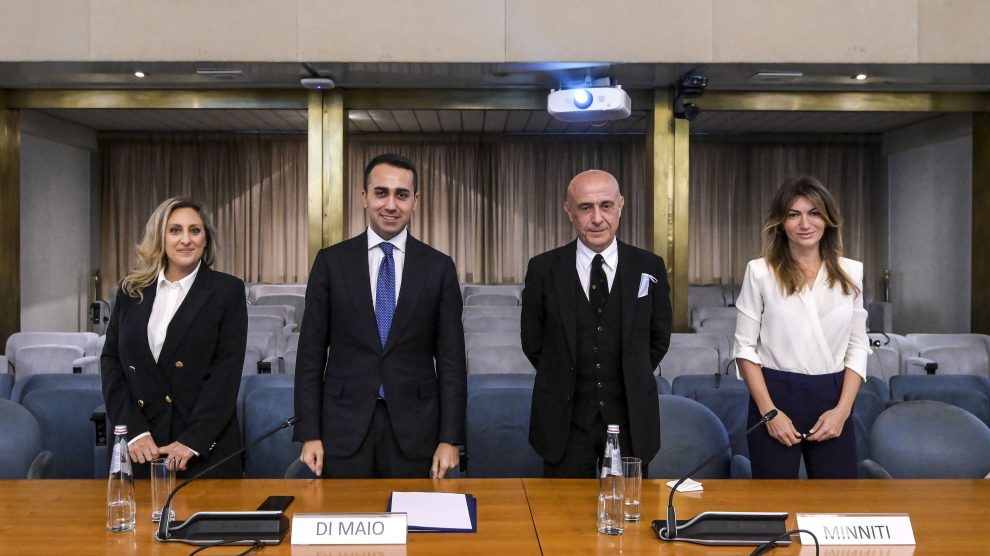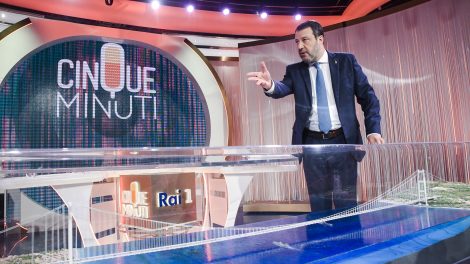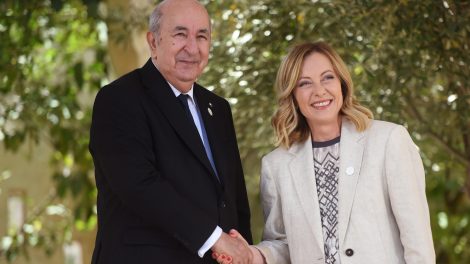Italy’s relationship with the USA, its “transatlantic anchorage” – in the context of its relationship with Europe – and the Mediterranean’s centrality. These were the main issues addressed by the Minister of Foreign Affairs, Luigi Di Maio, and the President of the Med-Or Foundation, Marco Minniti, who’s also a former FM. The duo was speaking at Decode39’s launch event at the Ministry of Foreign Affairs in Rome.
Our Director Valeria Covato began by explaining how Decode39, a spin-off of Formiche.net, came to be. “The phone country code enclosed in its name hints at the website’s mission, which is providing international readers with daily news, in-depth analysis and background on geopolitics as seen from Italy.”
“We started this project because we think that Italy’s voice is not heard enough abroad. Decode39 will be a space to understand and to make ourselves understood abroad, and in this space, following Formiche’s vocation, we will tell of the strategies of the Italian country-system, from institutions to enterprises, from diplomacy to intelligence, all with an eye on global challenges. We will be looking at the troubled areas of the wider Mediterranean, as well as the key areas for the development and security of our country.”
Flavia Giacobbe, director of the Formiche magazine and event moderator, took over by reaffirming the centrality of the Mediterranean and the importance of telling the world from Italy’s viewpoint. Then Minister Di Maio began by talking about the value of Italian foreign policy.
“In these very days, the Summit for Democracy convened by US President Joe Biden is underway. Yesterday’s speech by [Italian PM] Mario Draghi confirmed the capital of authority that comes from our transatlantic anchorage, from our undisputed reliability as an ally, and we have once again received great appreciation for the results obtained in the context of the G20,” said the minister.
Mr Di Maio also stressed Italy’s capacity for dialogue with other countries. “Putting different actors around a table, sometimes with conflicting perspectives and interests, is a distinctive feature of our international action, allowing us to have a frank – but always principled – dialogue with all the major global players.”
“We have always said so,” he continued. “Even with Russia and China, we […] relate to them with a frank and pragmatic attitude that must lead them to engage with the major issues that cannot be ignored,” such as climate change and the solution of regional crises, while “maintaining coordination with our European, Atlantic and G7 partners.”
The pandemic, he said, has highlighted “how cooperation and multilateralism, a traditional feature of Italy’s foreign policy action, are indispensable for tackling global challenges” such as access to and protection of global public goods, with climate change at stage centre, along with “health, terrorism, migration, and ultimately the challenge of fair, shared, sustainable development that respects human rights.”
It is no coincidence that Italy was among the first countries to call for an international alliance for the health response to Covid-19, and to put the identification of solutions centred on the individual and his fundamental rights at the centre of the multilateral agenda, Di Maio continued.
He then recalled that 2021 has been a year “of great international responsibilities for Italy, in the role of rotating chair of the G20 and co-chair of COP26,” as well as “the ministerial of the Anti-Daesh Coalition that I chaired with Undersecretary Antony Blinken in June,” further underlining the American link. “In each of these contexts,” the Minister reiterated, “Italy has been the spokesperson for effective multilateralism and the safeguarding of an international order based on rules and democratic values.”
In his speech, Mr Minniti shared Di Maio’s positions, praising his ability to keep foreign policy out of partisan logic. “In Italy we have always tried to preserve foreign policy from the tensions of domestic politics. We continue to do so. Foreign policy is an asset to the whole country.”
Hei added that Europe and the United States have “an indelible relationship, but [one] that must change profoundly. Today an alliance means that Europe must take responsibility. We must understand that the US strategic pivot towards the Pacific is unchangeable. This means that Europe must take responsibility in the Mediterranean, knowing that the Pacific and the Mediterranean are two key areas of the planet’s security.”
“The pandemic was a challenge for democracies,” went on Mr Minniti, “because autocracies could have been more capable of governing it. Democracies have met this challenge and it was not a foregone conclusion. If I look at [President] Biden’s Democracy Summit I see this red line. Democracies, which are often portrayed as inefficient, have won this challenge, while regimes are in more trouble,” he said.
Then Mr Di Maio spoke again. “The Quirinal Treaty, together with Next Generation EU, must be the pillar to consolidate European leadership,” stressing that Italy has “great expectations for the French presidency of the EU in the first six months of 2022.” However, collaboration with Paris is not exclusive, he added. “We are working on an enhanced dialogue with Germany, and we’ve accelerated a series of interlocutions with Spain too,” he said, reiterating that he sees a favourable condition for Italy to strengthen European leadership.
Di Maio also claimed that the Foreign Ministry had carried reforms to include the offices of foreign trade and internationalisation: ICE, SIMEST and SACE. “This does not make us backtrack on our shared values, this does not lead us to put our values in second place to economic convenience,” he declared.




